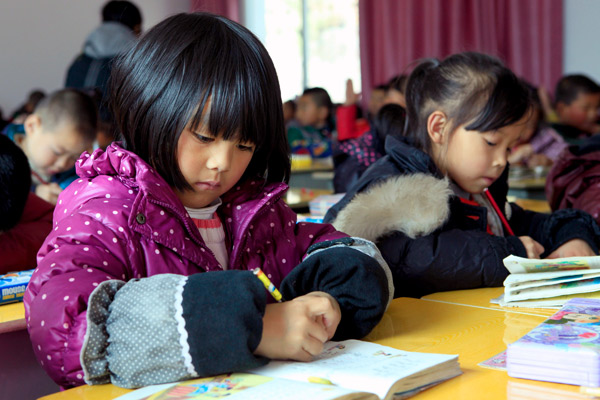Change focus of education reform
Updated: 2014-12-31 09:19
(China Daily)
|
|||||||||||
 |
|
Students work on their assignments earlier this month during class at Changjiang Primary School in Badong, a county in Hubei province, where no homework is assigned to the students.[Liang Bin / for China Daily] |
Only by reforming the local evaluation mechanism can the government achieve balanced distribution of education resources and curb the development of "super high schools", says an article on gmw. Excerpts:
The debate over "super high schools" such as Hengshui High School in North China's Hebei province has been going on for some time now. The Hengshui school is said to have achieved "high-score miracles" at the college entrance examination, or gaokao, many times. A majority of the students from Hebei who score high marks at gaokao invariably come from this school.
People have rightly blamed this development on the unbalanced distribution of education resources. Local governments cultivate these "super high schools" to improve their political performance and such schools use their "high-score miracle" to attract more good students, who, in turn, add to their success. As a result, people think getting their children to such a school is ticket to sure success.
The problem is that the gaokao reform is unwittingly encouraging the trend of "super high schools". The "good" universities always favor students from key high schools, making parents desperate to get their kids enrolled in one of them. That's why it is difficult to curb the practice of school selection fees and narrow the gap in the distribution of education resources in urban and rural areas.
Balanced distribution of education resources is a prerequisite for equality in education. Reform of the evaluation process for educational performance is crucial to balanced distribution of education resources. If quality of education in an area is not evaluated on the basis of the college admission rate, there will be fewer "super high schools".
Today's Top News
'Human error' at fault in disappearance of flight
US-listed Chinese shares poised for more gains in 2015
Experts recommend fighter plane for developing nations
US rejects China involvement in Sony cyberattack
Missing AirAsia plane maybe 'at sea bottom'
More than 200 evacuated from buring Italian ferry
Aviation's deadly 2014, yet safety record improving
Albania takes part in rescue efforts on burning Italian-flagged ferry
Hot Topics
Lunar probe , China growth forecasts, Emission rules get tougher, China seen through 'colored lens', International board,
Editor's Picks

|

|

|

|

|

|





